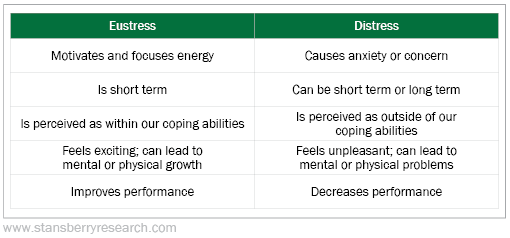The winter holidays are swiftly approaching. If you're not sensible, they'll easily become overly stressful, especially because of the COVID-19 pandemic...
This year, COVID-19 means many families around the world are stressing just trying to figure out how to unite safely. And as state governments impose stricter lockdowns, I'm not even sure where or for how long I'll go. Whatever I choose, I'll be sure to prepare for the stress of being with family.
In the past, I've managed the stress with a time rule. I like the three- to four-day rule... Stay about as long as fresh seafood will keep refrigerated. But there's the travel, full flights, delays, people with upper respiratory illnesses, sneezing, and coughing...
Today, we're going to tell you how to make the most out of your well-deserved festivities and how to turn any stressful event into something more bearable.
It turns out, not all stress is bad for you. In fact, in 1974, Hans Selye – widely known as the father of stress research – coined the term eustress. Eustress, from the Greek "eus," meaning "good," is really just a frame of mind.
Eustress is a form of stress that actually helps us grow and keeps us excited about life. Eustress is the kind of stress your body experiences when something exciting happens – like overcoming challenges, striving for goals, exercising, or trying something new2. Eustress can be motivating and make us hungry for life. Distress – on the other hand – is the harmful form of stress. Luckily, if you understand the concept of eustress, you can practice it and transform your distress into something positive.
Instead of viewing a situation as threatening, a eustress-inclined mind sees a challenge2. For example, say you lose your job. You could imagine not being able to pay your bills and ending up homeless (distress). Or you could see an opportunity to finally go for the job you've always wanted but never had the courage to try (eustress). When you encounter this situation and turn it into an exciting challenge to tackle, you end up developing your prospects.
My eustress holiday situation involves spending time with the ones I love... hanging out and cooking together, reading, relaxing, watching movies together, hiking... All of those things are great stresses to have.
Scientists and philosophers have been studying stress for many decades. The ancient Greek Stoic philosopher Epictetus even described eustress prior to his death in the year 135 A.D.: "It's not what happens to you but how you react to it that matters." Also, "Men are disturbed not by things, but by the view which they take of them."
When you look at eustress and distress side by side, it becomes clear just how important it is to develop this transformational tool...

More recently, scientists have discovered that eustress is positively correlated with life satisfaction, meaning if eustress increases, so too does life satisfaction. We have also discovered that having a eustress mindset is both good for learning and academic performance7. I'm happier and more satisfied when I practice eustress techniques. The tools you need to practice shifting your viewpoint are easy to use. You are the driver of your life and lead your own path to more fulfillment and satisfaction every day.
Here's how to turn distress into eustress:
- Find meaning and growth potential in the situation.
- Adopt a growth mindset and practice perseverance.
- Find support.
- Practice mindfulness.
- Breakdown the challenge into manageable steps.
- Imagine a positive future self.
Bottom line – learn to not think of so many things as threatening. Instead, consider life to be a series of welcome challenges that you can and will conquer.
With that idea in mind, spread the good stuff this winter – eustress.
What We're Reading...
- Eustress... The good type of stress.
- Something different: Six tips for holiday self-care.
Here's to our health, wealth, and a great retirement,
Dr. David Eifrig and the Health & Wealth Bulletin Research Team
November 17, 2020
